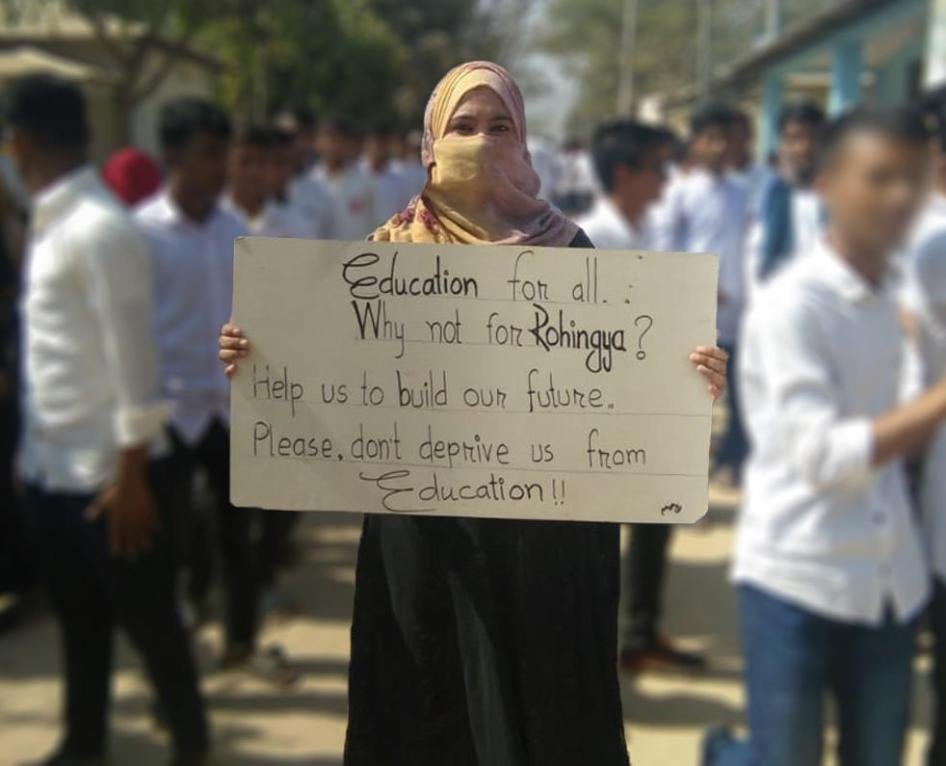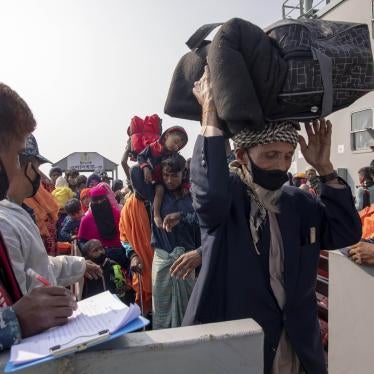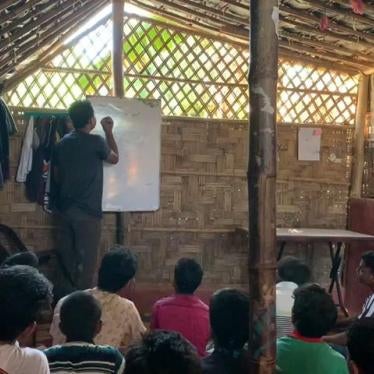(Bangkok) – Bangladesh officials are threatening to confiscate Rohingya refugees’ identity documents and forcibly relocate them to a remote, flood-prone island if they violate an arbitrary ban on refugee-led schools, Human Rights Watch said today. Refugees need the identity documents – called “data cards,” issued by the United Nations refugee agency with cooperation from the Bangladesh government – to access essential aid and services.
Since December 2021, Bangladesh authorities have banned schools that Rohingya teachers had established to compensate for the lack of formal and secondary-level education in the refugee camps, and closed madrasas that provide Islamic religious education. Bangladesh prohibits humanitarian groups from providing education for Rohingya refugee children beyond basic, informal, primary-level classes.
“First the government blocked meaningful education for Rohingya children, then it closed the schools Rohingya set up for themselves, and now it threatens to banish teachers and students to a prison-like island,” said Bill Van Esveld, associate children’s rights director at Human Rights Watch. “Foreign governments that want to support the Rohingya should be calling out Bangladesh for relentlessly blocking these children’s right to learn.”
Human Rights Watch spoke to 30 Rohingyas including 15 teachers along with Madrasa teachers, and 8 parents who described threats for violating the education bans, including being forcibly relocated to the island of Bhasan Char.
Bangladesh prohibits teaching Rohingya children the Bangla language, or the national curriculum, as part of the government’s policy to prevent Rohingya from integrating and remaining permanently in the country. The refugee-led schools teach the formal Myanmar curriculum, not the Bangladesh curriculum, however. “We used to teach like in the Myanmar school system, following the academic calendar,” a teacher said.
The Bangladesh authorities did not grant legal status to the refugee-led schools but agreed to a plan by humanitarian groups to support them in January 2020. However, in December 2021, Bangladesh reversed course and banned all Rohingya-led schools and “home-based” learning facilities, affecting roughly 32,000 students. Camp authorities converted some closed schools into shelters for refugee families who were brought from other camps, and issued threats to repress refugees’ efforts to continue teaching and studying after the school closures, teachers and parents from five closed schools in four camps told Human Rights Watch.
Each camp is run by a Bangladesh government official called the camp-in-charge, who oversees Rohingya community leaders called majhis. Under the direction of the camp-in-charge, “the majhis said to the people in their block that if anyone sends their kids to any unauthorized schools that teach the Myanmar curriculum, immediately the majhis have to take away the family’s data card and tell those families to make preparations for Bhasan Char,” said another teacher. Some teachers tried to operate a small learning facility to teach discreetly, but “parents are utterly terrified to send their kids,” he said.
A majhi, said he was “shocked” when his son’s school was closed in December, but powerless to stop it. “We [majhis] have to attend meetings with the camp-in-charge, who keeps saying we have to close down any private school or home-based learning center that is still operating.”
Refugees and humanitarian groups fear the school and madrasa closures are part of government plans to coerce more families to relocate to Bhasan Char. Bangladesh authorities have already moved about 22,000 Rohingya refugees to the remote, flood-prone island, where they face severe movement restrictions, food and medicine shortages, and abuses by security forces. Many have been transferred without full, informed consent, and have been prevented from returning to the mainland.
Most teachers Human Rights Watch spoke to had stopped teaching altogether due to the risks. “It is very hard, as students keep asking me when I am going to resume,” another teacher said. Camp officials also threatened families who allowed teachers to use their shelters for individual lessons, putting them “under immense pressure” and “creating panic,” refugees said.
A teacher who works for a humanitarian group in the camps also taught private lessons but stopped when a majhi warned that he would be fired from his job, his family card would be confiscated, and he would be sent to Bhasan Char.
Humanitarian groups are allowed to teach informal, unaccredited lessons to young children in the camps, but the closures of refugee-led schools left many students who are older and more advanced in their studies with no access to education, teachers said. “Since the closure of the schools, I have seen my students working in manual labor of one kind or another inside the camp,” one teacher said. “I doubt they will come back to school again.”
Two teachers said that girls who were students of theirs had stopped studying and were being married off by their parents after their schools were closed. One student said that camp authorities told her father that if she continued her schooling, they would tell the Armed Police Battalion he was involved in drug smuggling.
In another camp, a Rohingya man employed by the same police unit as a nighttime security guard said he was “instructed to check if any closed private schools are operating secretly. The [Camp-in-Charge] said those households’ names would be on the top of the list for relocation to Bhasan Char.”
Residents said that Bangladesh authorities had ordered the closure of several schools providing Islamic religious education, with more than 2,360 students. In one camp, officials closed 10 madrasas during February, including one that was locked by the camp-in-charge himself, residents said.
The World Bank, the Global Partnership for Education, and foreign bilateral donors and trade partners of Bangladesh should demand an immediate end to policies blocking Rohingya children’s education. The European Union granted Bangladesh free trade benefits contingent upon upholding human rights in treaties including the Convention on the Rights of the Child, which prohibits discrimination against refugee children’s education.
“The Bangladesh government is tightening the screws to prevent Rohingya refugee children from any access to formal education, after years of deliberately depriving them of quality schooling,” Van Esveld said. “The EU, US, and other major donors should pressure Bangladesh to reverse course and ensure refugee children don’t lose more than they already have.”









